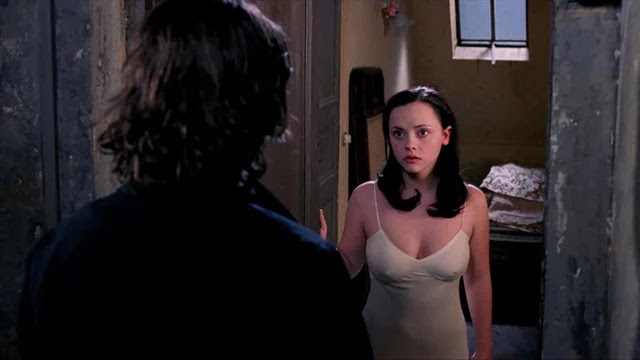The story begins with a young Jewish girl in Russia (Claudia Lander-Duke) whose father is leaving for America to establish himself so he can bring his family with him. Shortly after his departure rioters destroy the village and the young girl, along with her remaining family flee into the harsh wilderness. She is forced onto a ship alone, heading for Britain, where she is rechristened Suzie and adopted. As she grows older (now played by Christina Ricci) she learns to speak English and to sing, eventually turning that talent into a career in Paris, a means towards her eventual goal of finding her father in America. In Paris, she befriends a fellow Russian woman, Lola (Cate Blanchett) who convinces her to move in to save money towards the fare to America. Lola gets involved with Dante (John Turturro), an Italian opera singer with sympathies to Mussolini and the Nazis. Dante deduces Susie’s Jewish heritage and tries to use this to take advantage of her but she rebuffs his advantages. Simultaneously, Suzie has fallen for Cesar (Johnny Depp), a Gypsy who is also facing the dangers of the rise of fascism.
There is a lot to enjoy in The Man Who Cried. Unfortunately it is buried behind some poorly written scenes and clunky dialogue. Depp and Ricci give it their all but the two have zero chemistry and when their relationship gets physical neither of them are able to turn up the heat sufficiently or make us care about this underdeveloped romance. Lola and Dante’s relationship fares better primarily because Blanchett is able to sell her central conflict, being partnered with a man whom she disagrees with politically. Their love scenes are cold and distant, as they should be. Dante is a despicable human being and that plays off of Lola’s free spirit quite nicely.
Setting this film in pre war era Europe was a good choice as it allows for a realistic look at the prejudices of the time from several different vantage points. It also lends the film an atmosphere of melancholy that serves the plot well. There are no complaints about the production values here; It looks nice and authentic all around. But the characters populating this film are not fully fleshed out. At barely over an hour and a half in length there is not enough time to fully explore such a complex topic. Dante and Cesar get short changed because of this, coming across as two-dimensional, lacking any real nuance.
In the end, once Suzie finally gets to America, barely five minutes are dedicated to her finding her father and reconciling with him. With all this build-up, it’s unsatisfying to end it so abruptly. Too much is left unexplored leaving the whole affair shallow and disappointing. This is a film that needed another writer to come in and add about twenty more minutes of character moments to give us a reason to care for them beyond just the circumstances.
Director Sally Potter is known for making films about strong women in a world trying to pigeonhole them into roles society deems them fit for. Films like Orlando and The Last Tango do this well. In The Man Who Cried, however, we get perhaps the most muted heroine in Potter’s oeuvre. She has little dialogue and most of the time seems to be carried along through the film by those around her. When she does venture out on her own it leads to some of the most interesting scenes in the film such as her first encounter with the Gypsy camp and her winning over its occupants through song. All of this is punctuated with a fine array of opera music that lends mood and distinction whenever it is employed. Potter has a good ear for the music and it is used effectively throughout, especially when punctuating the moments between Suzie and her father.
This film is far from a bad film. It is very much watchable and it never gets boring. It lacks depth at times and needed more to it to really sink home the emotions it was trying to convey. Character development was virtually nonexistent with the exception of Lola who starts out as a gold-digger looking for a wealthy man to take care of her and eventually leaves that man to travel with Suzie to America. Her journey from vain and ambitious to humbled and unhappy plays out well here. But she is the only one given a solid arc and it’s not quite enough to carry the whole picture, especially as she is not the central character in this story. Suzie is the central character and she just doesn’t play an active enough role to carry this film making it disappointing overall. She’s too passive, even having to be coerced late into the film to continue on seeking her lost father, something she shouldn’t have to be convinced to do. It makes her a weaker character and, even worse, a forgettable one.
Release Date: September 2, 2000
Running Time: 100 Minutes
Rated R
Starring: Christina Ricci, Cate Blanchett, John Turturro, Johnny Depp and Harry Dean Stanton
Directed By: Sally Potter







Comments
Post a Comment